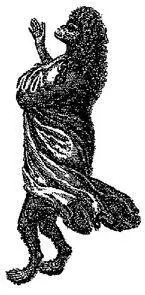Authority: “Nature gives no man the right to rule over others.”
Censure: “Nothing is more dangerous to faith than having it subject to human opinion.”
Clitoris: “A woman’s center of sexual pleasure.”
Courtier: “Applied to those who have been placed between kings and the truth, with the objective of keeping truth from reaching the kings.”
Man: “Man is worthless without land. Land is worthless without man.”
Inquisition: “Moctezuma was condemned for sacrificing prisoners to his gods. What would he say if he laid eyes on an auto-da-fé?”
Slavery: “Hateful commerce, against the law of nature, in which certain men buy and sell other men as if they were animals.”
Orgasm: “Is there anything else so worth achieving?”
Usury: “Jews did not practice usury. It was Christian oppression that forced the Jews to become money-lenders.”

The man who was music wrote music all day and all night and beyond all day and night, as if he were racing against death, as if he knew death would come soon.
He composed at a feverish pace, one piece after another, and in his scores he left some measures blank for improvising adventures in freedom.
No one knows how he found the time, but in his fleeting life he spent long hours with his nose in the books of his vast library, or enmeshed in animated discussion with people despised by the imperial police, like Joseph von Sonnenfels, the jurist who managed to get Vienna to outlaw torture, a first in Europe. His friends were the enemies of despotism and stupidity. A child of the Enlightenment, reader of L’Encyclopédie , Mozart shared the ideas that stirred up his times.
At the age of twenty-five, he lost his job as the king’s musician and never set foot in court again. From then on, he lived from his concerts and the sales of his works, which were many and highly valued, though lowly priced.
He was an independent artist when independence was a rare feat, and it cost him dearly. In punishment for his freedom, he died suffocated by debt: the world owed him for so much music, yet he died owing.

At the court in Versailles, more than a hundred perruquiers worked on those contraptions, which leaped over the Channel and landed on the skulls of the king of England, the duke of York, and other slave traders who imposed French fashion on the high nobility of Britain.
Male wigs began in France as a way to show class, not to hide baldness. The ones made of natural hair showered in talcum powder were the most expensive and required the mo every morning.

High class, high towers: the ladies, helped out by switches, now called extensions, wore complicated wire frames perched on their heads so their hair could rise floor by exuberant floor adorned with feathers and flowers. The rooftop of the hairdo might have been decorated with little sailboats or farms complete with toy animals. Putting it together was no mean feat, and just keeping it on your head was a challenge. As if that were not enough, the ladies had to navigate while wedged inside enormous crinolines that had them constantly bumping into each other.
Tresses and attire ate up nearly all the time and energy of the aristocracy. Any left over was spent at banquets. All that sacrifice was exhausting. The French Revolution did not meet much resistance when it swallowed the feast and crushed the wigs and crinolines.
THE DESPICABLE HUMAN HAND

In Spain, manual trades were dishonorable until the end of the eighteenth century.
Whoever lived or had lived from the labor of his hands, or who had a father, a mother, or grandparents of lowly, vile occupations, did not merit the courtesy of being called “sir.”
Among those lowly, vile occupations were
farmers,
stone carvers,
woodworkers,
vendors,
tailors,
barbers,
grocers,
and shoemakers.
These degraded beings paid taxes.
In contrast, exempt from paying taxes were
military officers,
nobles,
and priests.
THE REVOLUTIONARY HUMAN HAND

In 1789, the Bastille was attacked and taken by a furious mob.
And in all France the producers rose up against the parasites. The population refused to continue paying the tribute and tithes that had fattened the venerable and useless institutions of the monarchy, the aristocracy, and the Church.
It wasn’t long before the king and queen fled. Their carriage headed north toward the border. The little princes were dressed up as girls. The governess, dressed as a baroness, carried a Russian passport. The king, Louis XVI, was her butler; the queen, Marie Antoinette, her servant.
Night had fallen when they reached Varennes.
Suddenly, a crowd emerged from the shadows, surrounded the carriage, captured the monarchs, and returned them to Paris.

The king mattered little. The queen, Marie Antoinette, was the one they despised: for being a foreigner, for yawning during royal ceremonies, for going without a corset, for taking lovers. And for her extravagance. They called her “Madame Deficit.”
The spectacle drew a crowd. When the head of Marie Antoinette rolled at the feet of the executioner, the audience roared its approval.
A disembodied head. And no necklace.
All France was convinced the queen had bought herself the most expensive piece of jewelry in Europe, a necklace made of six hundred and forty-seven diamonds. Everyone also believed she had said if the people had no bread, let them eat cake.

The most famous anthem in the world came into being at a famous moment in world history. But it was also the child of the hand that wrote it and of the mouth that first sang it: the hand and mouth of its utterly unfamous composer, Captain Claude Rouget de Lisle, who wrote it in a single night.
Cries from the street dictated the words, and the music poured forth as if it had always been waiting inside him.
It was the turbulent year 1792: Prussian troops were marching against the French Revolution. Speeches and proclamations were stirring the streets of Strasbourg:
“Citizens, to arms!”
To defend the besieged revolution, the recently recruited Armée du Rhin was headed for the front. Rouget de Lisle’s anthem rallied the troops. The chorus swelled, tears flowed, and a couple of months later it reappeared, who knows how, at the other end of France. Volunteers in Marseille marched off to battle singing that powerful tune, which came to be called “The Marseillaise,” and all France sang the chorus. When the people attacked the Palace of the Tuileries, that was the song on their lips.
The composer was imprisoned, accused of treason for having committed the indiscretion of disagreeing with the Revolution’s sharpest ideologue, Madame Guillotine.
In the end Captain Rouget de Lisle was released. No uniform, no income.
For years he scrounged a living on the street, devoured by fleas, hounded by the police. When he said he was the father of the anthem of the Revolution, people laughed in his face.
Читать дальше



















